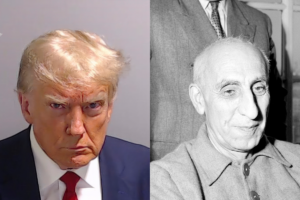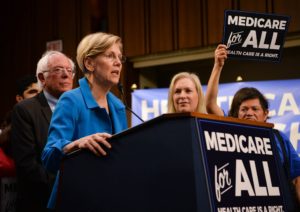Did Ford Trade Nixon Pardon for Presidency?
Victor Navasky, publisher emeritus of The Nation, recalls the magazine's legal battle over Gerald Ford's memoirs and the alleged deal the former president struck to pardon Richard Nixon.Victor Navasky, publisher emeritus of The Nation, recalls the magazine’s legal battle over Gerald Ford’s memoirs and the alleged deal the former president struck to pardon Richard Nixon.
Your support matters…Transcript from AlterNet:
AMY GOODMAN: … We’re going to turn now to another issue. We have Victor Navasky on the line with us. He’s publisher emeritus of the Nation magazine, chair of the Columbia University Journalism Review, and this is a case that involved the Nation magazine and former President Ford. Welcome to Democracy Now, Victor Navasky.
VICTOR NAVASKY: Good to be here, Amy.
GOODMAN: Can you talk about this case?
NAVASKY: Sure. Let’s see, in August of 1974, which was about a week before Nixon resigned, General [Alexander] Hague took Gerry Ford for a walk in the Rose Garden and told him that Nixon was going bonkers and they had to get him out of there, and there were four possible ways to do that. The first three turned out not to be realistic. But the fourth, he said, was if you would promise to pardon him after you become president, I think he would agree to resign.
Now, some years later Ford wrote about this in his memoir. And, someone — and his memoirs was being kept secret as they had sold publication rights and he had signed a contract saying that he wouldn’t talk about it until the book came out — and someone who had access to it asked me if I wanted to read it. And I said, not particularly, but I would, and it turned out that there was this one chapter that dealt with this conversation. And the way Ford told the story, he put a gloss of innocence on it, and I’ll tell you what he said in a minute. But we ran a story about the story and, subsequently, we were sued by the publisher and it went all the way up to the Supreme Court. And here’s, here’s what happened.
After Hague took Ford for a walk in the Rose Garden, Ford writes in his memoir that he came back to his office and he mentioned this to an aide of his named Bob Hartman, and the aide said, “And then what did you say, after you heard that?” And Ford said, “Well, I didn’t say anything.” And the aide said, “Gee, that’s not good, silence implies assent.” Because Ford had asked Hague, “Well, is it possible to pardon someone before he is indicted?” And Hague said, “Yes, we checked it out with our lawyers and it is.” So Ford says he then went to sleep, he didn’t say anything to Betty about it, and the next morning he got up and he mentioned it to another aide, a fellow named Jack Marsh. And Marsh said, “And then what did you say?” And, Ford said, “I didn’t say anything,” and this aide said, “Gee, that could be a time bomb.”
So Ford then writes that he then went and called General Hague and read him a statement, which he reprints in his book, and the statement said, “Nothing I did or didn’t say yesterday should be taken to mean that I did or didn’t agree to pardon or not to pardon Richard Nixon.” And he writes it as a kind of pro forma thing, and the way I read it was, it’s an attempt to put a gloss of innocence on a deal they had made. And this is a possible obstruction of justice, and that it’s something that he shouldn’t have done and against the law and, possibly, after he got nominated and confirmed, an impeachable offense even.
In any event, we wrote the story and … about a week or a couple of days later, I got a call from Herb Mitgang, who was a reporter for the New York Times, saying, “What’s your response to the telegram Harper & Row sent you?” I said, “What telegram?” And they had sent it to the New York Times, but our copy didn’t arrive until a day later, threatening a lawsuit and telling us to cease and desist excerpting from the Ford memoirs, which, of course, we hadn’t done. Well, the fact was, what had happened was, Time, which had agreed to excerpt from the book, canceled its excerpts because — cancelled its excerpts, because the deal was that Ford wasn’t — that nothing was supposed to come out about this conversation about the pardon until after they had run their story.
And we, of course, believed that the right of a public figure to keep his secrets while in office is fine, if he keeps them, and he certainly, or she, should be encouraged to write their memoirs so that the public gets the benefit of their thoughts about what happened. But they have no right to copyright the news. They have no right — they have the right to protect their style, and, of course, the Nation wasn’t interested in borrowing Ford’s style. The reason that we quoted from his memoirs was only so that we couldn’t be accused of distorting what he had to say, but the guy had written a book that ran about 110,000 words and we had quoted about 350 words. We quoted some others things which were very clearly public documents, but we also quoted correspondence and stuff that was part of the public’s business.
And the case, it was a very interesting case because Ford himself chose not to be a plaintiff. The plaintiffs were Time Inc., the Harper & Row and Readers Digest, which also had excerpts involved in the thing. And the amount of money at stake was only Time Inc.’s share of the $25,000 that was at issue, so it was $12,500, which barely qualified it for a federal lawsuit. It went all the way up to the Supreme Court, and at the trial level, the judge, a fellow named Richard Owen, was — had been a Nixon appointee, and he was a famous copyright protectionist judge and he decided for Ford.
At the appeals level, the judge was Kaufman, who had been the judge who sentenced the Rosenbergs to death, but Kaufman, about which the Nation had been very critical, but Kaufman — Irving Kaufman — was also a First Amendment absolutist and a Democrat, and he decided in the Nation’s favor. And then the thing was appealed to the Supreme Court and it was very interesting, because then the Supreme Court ultimately, where we were defended by Floyd Abrams, a First Amendment lawyer, and the ACLU, and the New York Times, and the New York Review of Books, and a bunch of other periodicals came to our defense.
But, to make it brief, the Supreme Court decided 6-3 against us and the decision was rendered by Sandra Day O’Connor, who these days is celebrated as, you know, a fair-minded balancer, etc., but she was a Republican appointee. And the fact was, and Byron was a right, voted on our side. So it was weirdly a playing out of the realist critique of jurisprudence where the Democrats for the most part voted one way and the Republicans the other. And the — in Justice O’Conner’s decision, she actually misstated some of the facts of the case. It was one of the technical things that is bedeviling to me is when a case is decided against you, but they get the facts wrong at the Supreme Court level, how do you get that corrected? Because there is no appeal from the Supreme Court. Anyway, that’s what happened with this, this sort of sideline of this Gerry Ford case.
GOODMAN: Finally, Victor Navasky, your thoughts today on President Ford’s legacy.
NAVASKY: Well, I think he — the most important thing he did was he pardoned Richard Nixon. And he, he — and if that was, indeed, the result of a deal, rather than this he’s being credited, and maybe properly so, with trying to heal the nation. But if he — if his attempt to heal the nation was a result of a deal he made while he was vice president of the United States, that’s an important missing piece of history. So, he’ll be celebrated because he’s a nice guy and he was a football player and all of that stuff, for the next week or two. But if it turns out that this deal was made, then history is going to have a harsher judgment about him.
GOODMAN: And the fact that he also not only pardoned Richard Nixon, but granted amnesty to draft era resisters, the significance of that?
NAVASKY: Well, I think you have to credit him for that. Time passes, and he was — he was in the healing business, on the one hand. On the other hand, what you mentioned earlier in the program about his attempt to impeach Justice Douglas for publishing in the Evergreen Review, which was an experimental, sort of hippie, avant-garde, very good and serious literary magazine, was outrageous. And so he’s, he’s a complicated guy who came across as a nice guy.
Independent journalism is under threat and overshadowed by heavily funded mainstream media.
You can help level the playing field. Become a member.
Your tax-deductible contribution keeps us digging beneath the headlines to give you thought-provoking, investigative reporting and analysis that unearths what's really happening- without compromise.
Give today to support our courageous, independent journalists.









You need to be a supporter to comment.
There are currently no responses to this article.
Be the first to respond.